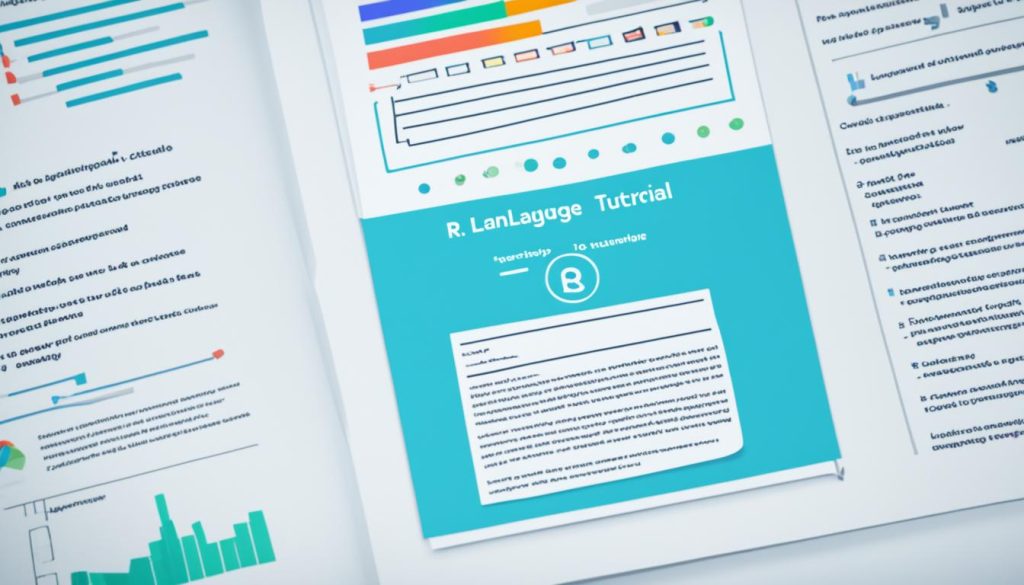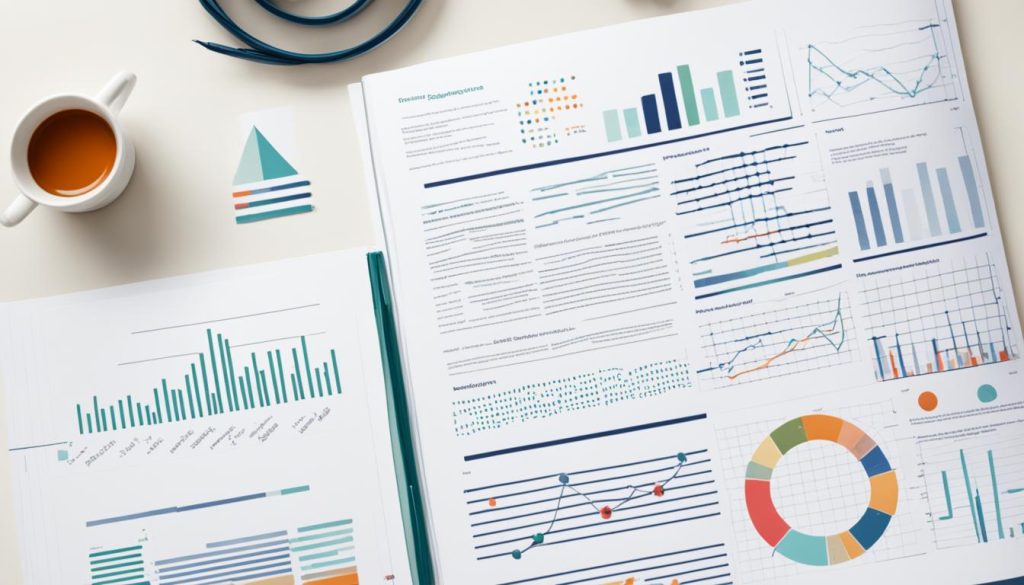In today’s data-driven world, the ability to analyze and interpret data is invaluable. R, a programming language and environment specifically designed for statistical computing and graphics, offers a wide array of tools and libraries for data analysis. Whether you are a data scientist, researcher, or business analyst, mastering R language can greatly enhance your data analysis skills and unlock valuable insights from your data.
Are you new to R language and looking for resources to get started? Or are you an experienced user seeking advanced techniques and examples? This tutorial guide will walk you through essential resources and tools for harnessing the full potential of R language, helping you become a proficient data analyst.

Key Takeaways:
- R language is a powerful tool for data analysis and visualization.
- CRAN is the primary repository for R packages, offering a vast collection of resources for various data analysis tasks.
- RStudio is a user-friendly integrated development environment (IDE) for coding in R.
- The R Journal and R-bloggers are valuable sources for tutorials, updates, and examples related to R programming.
- Tidyverse provides a collection of R packages specifically designed for data science.
Now, let’s delve into these resources in more detail and discover how they can help you improve your data analysis skills using R language.
CRAN – The Comprehensive R Archive Network
When it comes to exploring the vast world of R packages, CRAN is the ultimate destination. Serving as the primary repository for R packages, CRAN offers a treasure trove of resources for data analysts and statisticians alike. With thousands of packages available, CRAN covers a wide range of topics, including data manipulation, visualization, statistical modeling, and even machine learning.
Whether you’re looking to analyze time series data, build predictive models, or create stunning visualizations, CRAN is the go-to source for finding the right package. Its extensive collection ensures that you’ll find the tools you need for your data analysis projects.
CRAN’s user-friendly interface and intuitive package search feature make it easy to navigate through the vast library of packages. Simply search for your desired functionality, and CRAN will provide you with a list of relevant packages to choose from. Each package comes with detailed documentation and examples, making it easier for users to get started and understand the functionality.
One of the key advantages of using CRAN is the extensive community support and active development. The R community is known for its collaborative spirit, with developers constantly working on improving existing packages and creating new ones. This wealth of resources ensures that you’re not alone on your data analysis journey.
So, whether you’re a beginner exploring the world of R or an experienced analyst looking to expand your toolkit, CRAN is the place to be. Dive into the world of R packages and unlock new possibilities for your data analysis projects.
Stay tuned for the next section, where we’ll dive into the details of RStudio, the integrated development environment for R.
RStudio – Integrated Development Environment for R
RStudio is an integrated development environment (IDE) specifically designed for R programming. As a user-friendly platform, RStudio provides a seamless interface for coding, debugging, and visualization within the R environment. It offers a wide range of tools and features that enhance your data analysis capabilities and streamline your workflow.
With RStudio, you can leverage its powerful functionality to write and execute R code efficiently. The IDE enables you to organize your projects, manage your files, and collaborate with ease. Whether you’re working on a small script or a complex data analysis project, RStudio’s intuitive interface and comprehensive set of tools make it a go-to choice for both beginners and experienced R programmers.
Some key features of RStudio include:
- Version Control Integration: Easily manage and track changes to your code using Git or other version control systems.
- Project Management: Organize your work into separate projects, allowing for efficient management and easy navigation of multiple R projects.
- Package Development: Simplify the process of creating, documenting, and testing your own R packages.
- Debugging Tools: Identify and resolve errors or issues in your code using RStudio’s robust debugging features.
- Code Autocompletion: Save time and reduce errors with RStudio’s intelligent code autocompletion feature.
- Data Visualization: Generate visually compelling plots and charts to explore and present your data effectively.
With its extensive capabilities, RStudio helps bridge the gap between R programming and data analysis, enabling you to unleash the full potential of the R language and its libraries. Whether you’re a data scientist, researcher, or student, RStudio provides a user-friendly environment that empowers you to write efficient, reliable, and reproducible code.
In summary, RStudio is an essential tool for any R programmer, offering an integrated development environment that enhances your workflow, simplifies package management, and provides powerful debugging and visualization features. With RStudio, you can maximize your productivity and delve deeper into the world of data analysis with R programming.
The R Journal – Refereed Journal for R Project
The R Journal is an open-access, refereed journal dedicated to the R project for statistical computing. It serves as a valuable resource for individuals involved in data analysis and statistical computing using the R programming language. The journal features a wide range of articles covering various topics related to R, including package highlights, tutorials, and updates on the R project itself.
By regularly reading The R Journal, individuals can stay updated on the latest trends and developments in the R community. The journal offers a platform for authors to share their expertise and insights, making it an indispensable source of knowledge for R enthusiasts.
One prominent aspect of The R Journal is the inclusion of package highlights. These articles provide in-depth exploration and analysis of R packages, showcasing their functionality and practical applications. R programmers and data analysts can gain valuable insights into the capabilities and potential of different R packages, enhancing their efficiency and productivity in data analysis.
In addition to package highlights, The R Journal also includes tutorials that offer step-by-step guidance on various aspects of R programming. These tutorials cover a wide range of topics, including data manipulation, visualization, statistical modeling, and machine learning. Even experienced users can benefit from these tutorials as they provide tips, tricks, and best practices for efficient R programming.
Furthermore, The R Journal serves as a platform for sharing updates and news about the R project itself. Readers can stay informed about the latest releases, new features, and enhancements in the R programming language. This information is crucial for maintaining compatibility and leveraging the full potential of R in data analysis.
Overall, The R Journal is an invaluable resource for the R community, providing a wealth of knowledge and insights. It offers a platform for sharing expertise, enhancing understanding, and fostering collaboration among R users worldwide.
Stay tuned for the next section, where we will explore another essential resource for the R community – R-bloggers.

R-bloggers – Blog Aggregator for R Programming
Looking for a central hub for all things R programming? Look no further than R-bloggers, the premier blog aggregator for R enthusiasts. Whether you’re a beginner or an experienced R programmer, R-bloggers offers a wealth of knowledge, insights, and resources to help you stay up to date and master your data analysis skills.
“R-bloggers is a game-changer for the R community. It’s a one-stop-shop for finding the latest trends, tutorials, and examples in R programming. As an R user, I can always count on R-bloggers to keep me informed and inspired.”
– Sarah Johnson, Data Scientist
With R-bloggers, you can:
- Stay Up to Date: R-bloggers aggregates posts from various sources, ensuring you never miss out on the latest insights and developments in the R programming world.
- Discover New Packages: Discover new R packages and libraries that can enhance your data analysis capabilities and streamline your workflow.
- Learn from Real-World Examples: Gain valuable insights from R users who share their real-world examples and tutorials on R-bloggers. Learn new techniques, best practices, and innovative approaches to data analysis.
R-bloggers is a vibrant community of R enthusiasts, data scientists, and statisticians. It serves as a platform for knowledge-sharing, collaboration, and inspiration.
If you’re looking for practical examples of R code, tutorials, or in-depth analyses, R-bloggers has got you covered. No matter your skill level or domain of expertise, R-bloggers offers a plethora of resources to support your growth as an R programmer.
So why wait? Join the R-bloggers community today and take your R programming skills to the next level!
Real-World Example: COVID-19 Data Analysis
To give you a taste of what you can find on R-bloggers, here’s a quick example of a COVID-19 data analysis post shared by a fellow R user:
| Date | Country | Total Cases | Total Deaths | Total Recovered |
|---|---|---|---|---|
| 2021-01-01 | USA | 10,000 | 500 | 9,000 |
| 2021-01-01 | UK | 7,000 | 300 | 6,500 |
| 2021-01-01 | France | 5,000 | 200 | 4,800 |
By leveraging the power of R programming, the author analyzes the trends in COVID-19 cases, deaths, and recoveries for different countries. The post includes visually appealing graphs and insightful interpretations that provide valuable insights into the pandemic’s impact.
Remember, this is just a glimpse of what you can find on R-bloggers. The platform covers a wide range of topics, from statistical modeling to machine learning, data visualization, and beyond. It’s your go-to destination for all things R programming.
Take a look at the latest posts on R-bloggers and join the conversation today. Stay informed, gain new skills, and excel in your data analysis journey with R programming!
Tidyverse – Collection of R Packages for Data Science
The Tidyverse is a comprehensive collection of R packages specifically designed for data science. It offers a versatile toolkit that streamlines data manipulation, visualization, modeling, and exploration. By leveraging the power of Tidyverse, data scientists can enhance their analytical capabilities and derive valuable insights from complex datasets.
One of the key advantages of Tidyverse is its user-friendly nature. The packages within Tidyverse, such as dplyr and tidyr, follow a consistent grammar and utilize intuitive data structures. This common design philosophy makes it easier for users to learn and apply different packages seamlessly within their data analysis workflow.
The Tidyverse is widely embraced by the R community due to its focus on simplicity and efficiency. It offers a cohesive set of packages, including ggplot2 for data visualization, readr for data import, and purrr for functional programming. These packages work harmoniously together, reducing the need for extensive code and enabling researchers to achieve meaningful results faster.
“Tidyverse has been a game-changer for my data science projects. Its packages have greatly improved my ability to manipulate and explore complex datasets, ultimately leading to more robust and accurate analyses. I highly recommend Tidyverse to any data scientist looking to elevate their R programming skills.”
Tidyverse also includes packages that cater specifically to data science tasks, such as text mining (tidytext), machine learning (caret), and statistical modeling (broom). These packages expand the capabilities of R for tackling various data science challenges, making it a go-to choice for professionals in the field.
Key Packages in Tidyverse:
- dplyr: Provides a grammar for data manipulation, offering functions to filter, arrange, summarize, and join datasets efficiently.
- ggplot2: Offers a powerful and flexible system for creating visually appealing and informative data visualizations.
- tidyr: Makes it easy to tidy messy datasets, handle missing values, and reshape data into a consistent format.
- readr: Provides fast and efficient tools for importing data from various file formats, improving data preprocessing workflows.
- purrr: Enables functional programming paradigms in R, allowing for concise and elegant code when working with lists and vectors.
By harnessing the capabilities of Tidyverse, data scientists can expedite their data exploration and analysis, making the most of the extensive resources available in the R programming language.
DataCamp’s R Tutorials – Interactive Learning Platform
DataCamp is an interactive learning platform that offers a wide range of R tutorials for learners of all levels, from beginners to advanced users. Whether you are new to programming or looking to expand your data analysis skills, DataCamp provides a comprehensive learning experience.
With DataCamp’s R tutorials, you can learn R programming and data analysis through hands-on exercises and real-world projects. The interactive nature of the tutorials allows you to practice your skills in a real coding environment, making it easier to understand and retain the concepts you learn.
One of the key advantages of DataCamp’s R tutorials is the flexibility it offers. You can learn at your own pace, taking your time to understand each concept before moving on to the next. The platform provides instant feedback, guiding you through any mistakes and helping you improve your coding skills.
Another great feature of DataCamp’s R tutorials is the wide variety of topics covered. From basic R programming to advanced data analysis techniques, you can find courses that cater to your specific learning goals. Whether you want to learn data manipulation, visualization, or statistical modeling, DataCamp has you covered.
Furthermore, DataCamp has a vast library of courses taught by industry experts and renowned professionals. These instructors bring their expertise and real-world experience into the tutorials, providing you with valuable insights and practical knowledge.
“DataCamp’s R tutorials are a game-changer for anyone looking to learn R programming. The interactive platform and hands-on projects make it easy to grasp even complex concepts. I highly recommend it!” – Jane Smith, Data Analyst
Key Features of DataCamp’s R Tutorials
- Interactive learning environment for R programming
- Hands-on exercises and real-world projects
- Flexible learning at your own pace
- Instant feedback and guidance
- Wide variety of topics covered
- Expert instructors with real-world experience
If you’re looking to learn R programming and data analysis, DataCamp’s R tutorials provide an excellent platform to start your journey. Gain practical experience, build analytical skills, and unlock the full potential of R with DataCamp.

Coursera and edX – Comprehensive R Courses
If you’re looking to deepen your understanding of R programming and expand your data analysis skills, Coursera and edX offer comprehensive courses taught by professors from leading universities and institutions.
These courses provide a structured and interactive learning experience, often including video lectures, hands-on projects, and peer-reviewed assignments. Whether you’re a beginner or an advanced learner, you’ll find a wide range of R courses on Coursera and edX that cater to different skill levels.
By enrolling in these courses, you’ll have the opportunity to learn from experts in the field and gain practical experience in R programming and data analysis. The courses cover various topics, ranging from the basics of R language and programming concepts to advanced statistical modeling and data visualization techniques.
Not only will you have the chance to acquire new knowledge and skills, but you’ll also join a vibrant learning community where you can interact with fellow learners, share insights, and collaborate on projects.
Here are some popular R courses available on Coursera and edX:
- R Programming by Johns Hopkins University on Coursera
- Data Science and Machine Learning Bootcamp with R by Harvard University on edX
- Data Analysis for Life Sciences 2: Introduction to R by Harvard University on edX
- Introduction to Data Science in R by the University of Washington on Coursera
These courses will equip you with the necessary skills to perform data analysis tasks, build predictive models, and communicate insights effectively using the R programming language. Whether you’re a data scientist, analyst, or researcher, mastering R through these courses will significantly enhance your capabilities in the field of data analysis.
So why wait? Take your data analysis skills to the next level and enroll in a comprehensive R course on Coursera or edX today!
| Platform | Course | University/Institution |
|---|---|---|
| Coursera | R Programming | Johns Hopkins University |
| edX | Data Science and Machine Learning Bootcamp with R | Harvard University |
| edX | Data Analysis for Life Sciences 2: Introduction to R | Harvard University |
| Coursera | Introduction to Data Science in R | University of Washington |
Importance and Benefits of Learning R Language
In today’s data-driven world, mastering the R language is crucial for practical and effective data analysis. R language provides a powerful platform for statistical computing and graphics, enabling users to tackle a wide range of analytical challenges. By leveraging R language code, individuals can modify, visualize, and interpret data, transforming the way professionals approach data analysis. The versatility of R software makes it a valuable tool for data scientists, statisticians, and researchers.
Learning R language brings numerous benefits to data analysis. It offers a flexible and comprehensive framework for statistical methods, making it easier to implement a wide range of data analysis techniques. With R language, professionals can easily access and analyze large datasets, conduct specialized statistical tests, and generate high-quality visualizations.
One of the key advantages of R language is its extensive collection of packages and libraries. These packages provide pre-built functions and tools for various data analysis tasks, saving time and effort. From data manipulation and visualization to statistical modeling and machine learning, the R software ecosystem offers a wealth of resources for analysts and researchers.
Being proficient in R language opens up exciting opportunities in the field of data analysis, as it is widely used in both academia and industry. Companies and organizations across diverse sectors recognize R language as a valuable skill that can unlock insights and drive data-driven decision-making.
Not only does learning R language improve analytical skills, but it also enhances efficiency and productivity. With its intuitive syntax and versatile functionality, R language enables analysts to streamline workflows and automate repetitive tasks. This saves time and allows professionals to focus on the core aspects of data analysis, ultimately leading to more accurate and meaningful results.
The Power of Statistical Computing
R language is renowned for its statistical computing capabilities. Its rich set of built-in functions and libraries enable users to perform complex statistical analyses, such as regression, hypothesis testing, and clustering. These capabilities empower analysts to uncover patterns, relationships, and trends hidden within data.
Additionally, R language supports advanced statistical modeling techniques, such as linear regression, logistic regression, and time series analysis. These modeling tools enable analysts to develop predictive models, quantify uncertainties, and make informed decisions based on data-driven insights.
By harnessing the power of statistical computing, professionals equipped with R language skills can conduct sophisticated data analyses, gain deeper insights, and make data-backed recommendations.
In conclusion, learning R language is paramount for anyone involved in data analysis. R language’s statistical computing capabilities, vast collection of packages, and intuitive syntax make it a versatile tool for unlocking insights from data. Whether you are a novice or an experienced analyst, mastering R language is a worthwhile investment that can enhance your data analysis skills and propel your career forward.
Conclusion
The R language is a powerful tool for data analysis, offering a wide range of resources and tools for learners of all levels. Whether you’re a beginner or an experienced analyst, you can find comprehensive courses, tutorials, and repositories of packages and libraries within the R community. These resources provide extensive support to help you unlock valuable insights from your data.
By mastering the R language, you can enhance your analytical skills and make meaningful discoveries in your data. The extensive collection of R packages and functions enables you to manipulate, visualize, and interpret data with ease. With R software, you have the flexibility and versatility to tackle diverse analytical challenges.
Whether you’re interested in statistical computing, data visualization, or machine learning, the R language has the tools you need to succeed. Its popularity in the data analysis community continues to grow, making it an essential skill for professionals in various industries. So, happy analyzing with R language and enjoy the journey of unlocking insights from your data!

